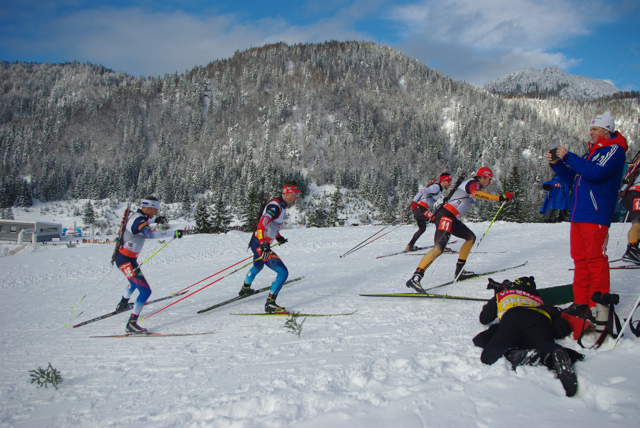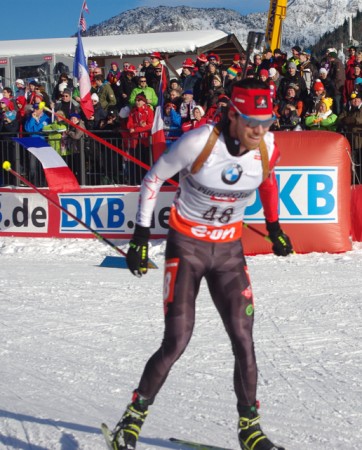
HOCHFILZEN, Austria – The five North American athletes who qualified for today’s men’s 12.5 k World Cup pursuit each had their work cut out for them if they wanted to meet their goals. After the sprint on Friday was disrupted by a snowstorm, the results didn’t fairly reflect each athlete’s performance (more info: stories about the Canadian and U.S. teams).
Lowell Bailey of the United States had been frustrated to end up out of the top ten – and off the podium even – despite clean shooting and what he felt was good skiing. Teammat Tim Burke had made the podium the weekend before in Östersund, Sweden, but placed 24th in the sprint here. Ditto on Canada’s Jean Philippe Le Guellec, who had placed fourth in the individual in Östersund but 13th on Friday despite a single penalty.
Then there was Nathan Smith and Brendan Green, each trying to complete their Olympic qualification for Canada. Green had come so close in the sprint – he needed a top 30, and finished 31st, just 0.1 seconds away from his mark. It seemed like the pursuit would offer a second chance to make that qualification.
Green needed more if he wanted to finish his qualification – a second top-16 finish (Green already had two of three top-30’s, a different way to qualify from the two top-16’s that Smith had already collected one of). But starting late in the pursuit, he had been hammered by the snowstorm and placed 48th. Getting his criteria in the pursuit was obviously going to be tough.

But in the end it was Smith who came the closest to knocking off his goals: with a single penalty and the ninth-fastest isolated pursuit time, he moved all the way up to 27th. Now, instead of a top-16 to complete his qualification, he needs a top 30 in the final week of racing instead.
The rest of the men struggled for various reasons. Or, if you ask Burke, maybe they didn’t even struggle. They just didn’t have great results.
“I was happy with the shooting and the performance, it’s just that everyone was shooting really well,” Burke said. “So it was tough. I guess I would have thought that with two penalties I would have been in the top 15 for sure… A day like today I feel like I performed really well, but I’m 21st. Not exactly a result that I’m too excited about, but I’m happy with the performance and I think I’m headed in the right direction.”
Burke said that thing that was strange about this pursuit was that it was based off the unusual results from the sprint. That meant that there were a lot of fast, strong athletes starting later in the order than usual – and so simply shooting well wasn’t enough to move up. The normal rules didn’t apply.
“We saw some people towards the end of the race with really low bib numbers who were struggling,” he said. “I think they benefitted a lot in the sprint. In that way it was definitely different.”
For Le Guellec, this certainly played a role – his four penalties dropped him to 32nd – but the schedule was also unusual.
“I think it was a weird pursuit because they spread it out with the relay in middle,” he said. “Being the third race, you know, the relay is usually the last race, and 7.5 k you can do even if you’re dying a little bit. But with 12.5 k as the last race in a three-in-a-row race weekend, it’s pretty rough.”
After saying that he “didn’t consider himself worthy of an interview,” Le Guellec explained that he just didn’t have it in his legs for such a long effort today.
“Skiing was good for the first two laps, but then I just died in the third lap,” he said. “I just couldn’t maintain pace with whoever was passing me… I was talking with Lowell and it can go both ways, either you’re going to feel good, or you’re going to die. I died.”
Bailey also had four penalties, and finished just ahead of Le Guellec in 30th.
And Green, too, spent more time in the penalty loop than he would have preferred. Three missed shots left him in 43rd, Olympic qualification criteria still incomplete. If Canada does not qualify four men for the Olympics by the end of racing next weekend in France, they will face a trials series back in Canmore just a few days later.
So for many of the men, it was a frustrating ending to an imperfect weekend in Hochfilzen, which also saw both men’s relay teams come close to best-ever performances.
At this point in his career, Burke said, he tries not to get too hung up on the results, and to think about how he’s feeling. But it’s hard and he’s not always successful.
“It’s funny,” he mused. “Last weekend I had a podium, but this weekend I actually felt better. I think that’s a really good sign going into the final week of racing before Christmas.”
Results / international race report
Chelsea Little
Chelsea Little is FasterSkier's Editor-At-Large. A former racer at Ford Sayre, Dartmouth College and the Craftsbury Green Racing Project, she is a PhD candidate in aquatic ecology in the @Altermatt_lab at Eawag, the Swiss Federal Institute of Aquatic Science and Technology in Zurich, Switzerland. You can follow her on twitter @ChelskiLittle.



